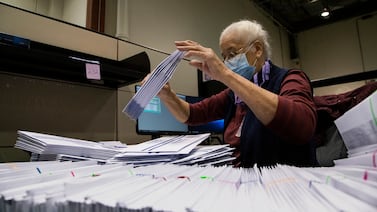Votebeat is a nonprofit news organization reporting on voting access and election administration across the U.S. Sign up for Votebeat Wisconsin’s free newsletter here.
Polls closed across Wisconsin after an Election Day marked most notably by a human error in Milwaukee that prompted city election officials to count 31,000 absentee ballots all over again, potentially delaying the state’s unofficial results for hours.
In other areas around the state, problems appeared minimal despite long lines and rain. Some election officials said they had unprecedented turnout but managed it. Madison received bomb threats, likely originating from Russia, directed at several current and former polling places, but city police didn’t deem the threats credible and didn’t interrupt voting because of them.
By 9 p.m., election officials had already tabulated around 1.4 million absentee and in-person ballots across the state.
Unlocked tabulator doors prompt decision to count ballots again
In Milwaukee, election chief Paulina Gutiérrez projected that the city’s counting of absentee ballots would go well into Wednesday morning, partially a result of her decision Tuesday afternoon to make election workers count 31,000 absentee ballots all over again because some staff didn’t lock tabulator doors in the early morning.
For security reasons, those panel doors — which cover the on/off switch and sometimes a slot for USB drives — are to be locked during counting, though other security measures ensured there was no chance of tampering.
The decision to restart the count, city spokesperson Jeff Fleming said, was “out of an abundance of caution.”
Wisconsin Elections Commission Administrator Meagan Wolfe said the commission didn’t weigh in on the city’s decision to rerun the batch of ballots, but she praised the city’s transparency throughout the process.
After Gutiérrez made that decision, the city put out an all-call to every Milwaukee employee to help election officials count the ballots that had already been tabulated. Between 30 and 50 city staff from health, fire, and other departments came to help, city spokesperson Caroline Reinwald said.
“Things are moving really smoothly right now and quickly, so hopefully this isn’t actually that much of a delay,” she said.
But Republican leaders criticized the oversight that led to the second count. U.S. Sen. Ron Johnson of Wisconsin called Milwaukee’s central count “grotesquely disorganized.” State GOP Chair Brian Schimming said about election officials, “You had one job,” adding that the election operation had gone “ridiculously wrong.”
Johnson said his concerns about Milwaukee election officials’ oversight could be alleviated if they present him video logs of the central counting site as well as records from the initial and second count of the 31,000 absentee ballots, including how they’re split by party. There are video streams of central count, but vote totals weren’t exported in the manner that Johnson was seeking, though each vote has a paper trail, city officials stated.
Milwaukee officials had counted 64,000 absentee ballots of around 108,000 total by 8:30 p.m., including the initial batch of ballots that was rerun through tabulators.
Under Milwaukee rules, all of the city’s ballots are processed and tabulated at one central location. State law doesn’t allow election officials to tabulate or process any ballots before Election Day, a policy that is partially responsible for the typically late reporting of results from absentee ballots.
A bipartisan group of lawmakers tried to change that policy this past legislative session, but the Republican-written proposal to allow some ballot processing on the Monday before an election stalled in the Senate.
“It certainly seems like, if we did have laws that were a little bit different, that allowed pre-processing, like the majority of other states, that potentially we could have unofficial results earlier in the evening,” Wolfe said.
Election Day in Milwaukee was also marked by a lawsuit filed by the Republican National Committee, alleging that GOP election observers were being restricted at city election sites. The GOP walked back its claims at a Tuesday hearing, conceding there weren’t any issues.
Hoax bomb threat doesn’t disrupt voting
Outside of Milwaukee, election officials faced few issues.
The Madison Police Department received bomb threats for several current and former polling sites via several emails that appeared to be from an automated bot, perhaps linked to Russia, city spokesperson Dylan Brogan said. Police immediately thought they were bogus, and voting wasn’t disrupted at any voting location, Brogan said, though they followed up to make sure everything was fine.
In Thornapple, a northern Wisconsin town that faced a Justice Department lawsuit over its decision not to use accessible voting machines in the past, election officials did have a voting machine in use, said Erin Webster, a local resident who was an election observer on Tuesday.
Meanwhile, by 9 p.m., Wisconsin voters appeared overwhelmingly in support of a constitutional amendment to ban voting by noncitizens across Wisconsin. The amendment would have little practical effect on who can vote under existing laws, but it would bar municipalities from opening their local elections to noncitizens or younger voters.
The state had a surge of early in-person voting, but election officials said that Tuesday was still very busy. Melissa Kono, who has been a clerk in the small northern Wisconsin town of Burnside since 2013, said it was the most intense election she had ever administered in terms of turnout.
Alexander Shur is a reporter for Votebeat based in Wisconsin. Contact Alexander at ashur@votebeat.org.





